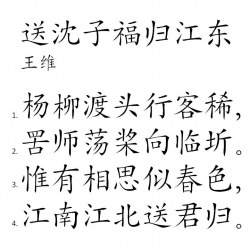dailycharacter
送沈子福归江东(王维)
Title: Farewell to Shen Zifu, Returning to the East ▪
送沈子福归江东
Author: Wang Wei ▪ 王维
Poetic Form: júejù ▪ 绝句
Apologies, individual character links no longer available for this poem...
1. (杨 + 柳) + (渡 + 头) + ((行 + 客) + 稀)
(willow + willow) + (ferry + head) + ((to walk +
guest) + rare)
gloss: Beneath the willows, there are few
travelers on the ferry
2. (罟 + 师) + (荡 + 桨) + (向 + 临 + 圻)
(fish net + master) + (to sway + oar) + (toward +
facing + border)
gloss: The boatman rows (with oars) toward the
border
3. 惟 + 有 + (相 + 思) + 似 + (春 + 色)
only + to have + (to examine + to long for) + to
resemble + (springtime + color)
gloss: Only this longing in my heart resembles the
color of spring
4. (江 + 南) + (江 + 北) + 送 + 君 + 归
(river + south) + (river + north) + to see off + you
+ to return home
gloss: [My feelings] would see you return [safely]
home wherever that would be [up the river or
down it].
送沈子福归江东
Author: Wang Wei ▪ 王维
Poetic Form: júejù ▪ 绝句
Apologies, individual character links no longer available for this poem...
1. (杨 + 柳) + (渡 + 头) + ((行 + 客) + 稀)
(willow + willow) + (ferry + head) + ((to walk +
guest) + rare)
gloss: Beneath the willows, there are few
travelers on the ferry
2. (罟 + 师) + (荡 + 桨) + (向 + 临 + 圻)
(fish net + master) + (to sway + oar) + (toward +
facing + border)
gloss: The boatman rows (with oars) toward the
border
3. 惟 + 有 + (相 + 思) + 似 + (春 + 色)
only + to have + (to examine + to long for) + to
resemble + (springtime + color)
gloss: Only this longing in my heart resembles the
color of spring
4. (江 + 南) + (江 + 北) + 送 + 君 + 归
(river + south) + (river + north) + to see off + you
+ to return home
gloss: [My feelings] would see you return [safely]
home wherever that would be [up the river or
down it].
Translation
Farewell to Shen Zifu, Returning to the East
translation by Jessica Alexander ©
Beneath the willows, the ferry nigh empty,
Its boatman rows for the frontier.
My heartsick soul alone is colored spring...
Upriver, downriver: it would see you home.
translation by Jessica Alexander ©
Beneath the willows, the ferry nigh empty,
Its boatman rows for the frontier.
My heartsick soul alone is colored spring...
Upriver, downriver: it would see you home.
Analysis
In this poem, Wang Wei describes the departure of his friend, Shen Zifu, as he returns home to the east. The first half of the poem describes the physical setting; the second half tells us of the poet’s feelings, his unwillingness to part with a dear friend.
There was a tradition during the Tang Dynasty of snapping willow branches when seeing someone off. Opening the poem with willows not only sets the physical scene, but makes it clear to the reader that someone is leaving on a long journey, though it is not until line 4 that we discover Shen Zifu is returning home (归).
In line 3, Wang Wei alludes to the fact that spring is showing its face everywhere; he suddenly thinks that the melancholy in his heart looks just like this flowering of the springtime.
It is a simple poem for a complex emotion, and its author leaves much unsaid.
There was a tradition during the Tang Dynasty of snapping willow branches when seeing someone off. Opening the poem with willows not only sets the physical scene, but makes it clear to the reader that someone is leaving on a long journey, though it is not until line 4 that we discover Shen Zifu is returning home (归).
In line 3, Wang Wei alludes to the fact that spring is showing its face everywhere; he suddenly thinks that the melancholy in his heart looks just like this flowering of the springtime.
It is a simple poem for a complex emotion, and its author leaves much unsaid.

